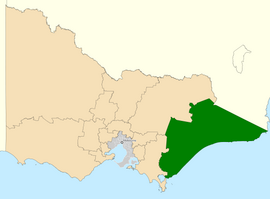Division of Gippsland
| Gippsland Australian House of Representatives Division | |
|---|---|
 Division of Gippsland in Victoria, as of the 2022 federal election | |
| Created | 1901 |
| MP | Darren Chester |
| Party | National |
| Namesake | Gippsland |
| Electors | 114,568 (2022) |
| Area | 33,131 km2 (12,792.0 sq mi) |
| Demographic | Rural |

The Division of Gippsland is an Australian electoral division in the state of Victoria. The division was proclaimed in 1900, and was one of the original 65 divisions to be contested at the first federal election. It is named for the Gippsland region of eastern Victoria, which in turn is named for Sir George Gipps, Governor of New South Wales 1838–1846. It includes the towns of Bairnsdale, Morwell, Sale and Traralgon.
Geography
[edit]Since 1984, federal electoral division boundaries in Australia have been determined at redistributions by a redistribution committee appointed by the Australian Electoral Commission. Redistributions occur for the boundaries of divisions in a particular state, and they occur every seven years, or sooner if a state's representation entitlement changes or when divisions of a state are malapportioned.[1]
History
[edit]It is one of two original divisions in Victoria to have never elected a Labor-endorsed member, the other being Kooyong. It has been held by the National Party and its predecessor, the Country Party, since 1922: it is the only seat the party has held continuously since its creation. On its new boundaries, however, it takes in most of the industrial Latrobe Valley.
Prominent former members include Allan McLean, a former Premier of Victoria who served as a minister under George Reid; and Peter Nixon, a senior minister in the Coalition governments from Harold Holt to Malcolm Fraser.
Then-sitting MP Peter McGauran announced his resignation in April 2008, sparking a June 2008 by-election, with the three major parties all contesting the election. The Nationals retained the seat on an increased margin, electing Darren Chester.
Members
[edit]| Image | Member | Party | Term | Notes | |
|---|---|---|---|---|---|

|
Allan McLean (1840–1911) |
Protectionist | 29 March 1901 – 12 December 1906 |
Previously held the Victorian Legislative Assembly seat of Gippsland North. Served as minister under Reid. Lost seat | |

|
George Wise (1853–1950) |
12 December 1906 – 26 May 1909 |
Lost seat | ||
| Independent Liberal | 26 May 1909 – 31 May 1913 | ||||

|
James Bennett (1874–1951) |
Liberal | 31 May 1913 – 5 September 1914 |
Lost seat | |

|
George Wise (1853–1950) |
Independent Labor | 5 September 1914 – 22 February 1917 |
Served as minister under Hughes. Lost seat | |
| Nationalist | 22 February 1917 – 16 December 1922 | ||||

|
Thomas Paterson (1882–1952) |
Country | 16 December 1922 – 7 July 1943 |
Served as minister under Bruce and Lyons. Retired | |

|
George Bowden (1888–1962) |
21 August 1943 – 2 November 1961 |
Retired | ||

|
Peter Nixon (1928–) |
9 December 1961 – 2 May 1975 |
Served as minister under Holt, McEwen, Gorton, McMahon and Fraser. Retired | ||
| National Country | 2 May 1975 – 16 October 1982 | ||||
| Nationals | 16 October 1982 – 4 February 1983 | ||||

|
Peter McGauran (1955–) |
5 March 1983 – 9 April 2008 |
Served as minister under Howard. Resigned to retire from politics | ||

|
Darren Chester (1967–) |
28 June 2008 – present |
Served as minister under Turnbull and Morrison. Incumbent |
Election results
[edit]| Party | Candidate | Votes | % | ±% | |
|---|---|---|---|---|---|
| National | Darren Chester | 54,635 | 54.14 | +0.14 | |
| Labor | Jannette Langley | 19,404 | 19.23 | −3.97 | |
| One Nation | Greg Hansford | 9,443 | 9.36 | +9.36 | |
| Greens | Marjorie Thorpe | 8,545 | 8.47 | +2.43 | |
| United Australia | Gregory Forster | 4,593 | 4.55 | +0.15 | |
| Liberal Democrats | Jim McDonald | 4,286 | 4.25 | +4.25 | |
| Total formal votes | 100,906 | 97.04 | +2.26 | ||
| Informal votes | 3,073 | 2.96 | −2.26 | ||
| Turnout | 103,979 | 90.89 | −1.49 | ||
| Two-party-preferred result | |||||
| National | Darren Chester | 71,205 | 70.57 | +3.90 | |
| Labor | Jannette Langley | 29,701 | 29.43 | −3.90 | |
| National hold | Swing | +3.90 | |||

References
[edit]- ^ Muller, Damon (14 November 2017). "The process of federal redistributions: a quick guide". Parliament of Australia. Retrieved 19 April 2022.
- ^ Gippsland, VIC, 2022 Tally Room, Australian Electoral Commission.
